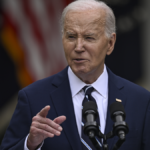
Democrats are cheering for the conservative majority Supreme Court after a Tuesday ruling in Moore v. Harper, saying the rejection of the so-called independent state legislature theory marked a win for voting rights.
“Today, the Supreme Court soundly rejected a fringe, far-right assault on a sacred pillar of American Democracy: the right to vote,” Rep. Nancy Pelosi (D-CA) said in a statement. “With its ruling in Moore v. Harper, the Court refused to embrace the MAGA Republicans’ radical independent state legislature theory, while reaffirming our Founders’ vision of checks and balances in conducting our elections.”
UNIVERSAL BASIC INCOME PAYMENTS: BIG CITIES THAT HAVE JUMPED INTO PROGRAMS TO GIVE AWAY MONEY

Senate Majority Leader Chuck Schumer (D-NY) also joined in lauding the 6-3 decision, which saw the court’s liberal justices, Elena Kagan, Sonia Sotomayor, and Ketanji Brown Jackson, team up with conservative Chief Justice John Roberts and Justices Brett Kavanaugh and Amy Coney Barrett.
“Today’s ruling reaffirms the long-standing precedent that respects our constitutional system of checks and balances,” Schumer said, quoting the late Georgia Rep. John Lewis, who said: “Democracy is not a state. It is an act.”
Vice President Kamala Harris also chimed in after the ruling, calling on Congress to “protect voters and our democracy” by passing the John Lewis Voting Rights Advancement Act and the Freedom to Vote Act.
The celebration among Democrats follows a Tuesday morning ruling in Moore v. Harper that held state courts do have the right to police state election laws, a rejection of the ISL theory.
Proponents of the ISL theory, which has never been embraced by the Supreme Court, argued that it supports the notion that legislatures have ultimate power under state law when it comes to setting election rules.
Conservative Justice Clarence Thomas penned a lengthy dissent against the majority, with the endorsement of Justice Neil Gorsuch and in part of Justice Samuel Alito.
Thomas wrote that the holding by the majority would have “the effect of investing potentially large swaths of state constitutional law with the character of a federal question not amenable to meaningful or principled adjudication by federal courts,” also noting that the decision should be “moot” because the lower court, the North Carolina Supreme Court, vacated the ruling that inspired the petition to the highest court.
This ruling rejects the far-right theory that threatened to undermine our democracy, and makes clear that courts can continue defending voters’ rights—in North Carolina and in every state. Thanks to @RedistrictFdn and @EricHolder for helping make this happen.
— Barack Obama (@BarackObama) June 27, 2023
Even former President Barack Obama spoke out on the ruling, echoing the words that the court rejected the “fringe” theory that would have limited state court oversight of election laws and maps made by state legislatures.
The Moore opinion comes just weeks after the Supreme Court held that Alabama discriminated against black voters during its redistricting process last year when it failed to create a second majority-black district, another opinion that could benefit Democrats in the 2024 elections.
Ramifications were already underway from the decision over Alabama’s maps this week after the Supreme Court this week dismissed Louisiana’s bid to prevent its voting map from being redrawn over allegations that it unlawfully diluted the power of black voters.
Louisiana Democrats celebrated that order, tweeting, “1/3 of 6 is still 2! Louisiana voters deserve fair maps that guarantee equal representation — and it looks like we’re going to get them!”
Celebration of the high court by Democrats comes as the party has in recent months cast a skeptical view of the credibility among the six Republican-appointed justices, namely over their decision last year to overturn Roe v. Wade.
Last term, the high court saw 13 decisions that were split 6-3 between the ideological breakdown of the conservative majority and liberal minority. This term, there have only been two cases decided through that type of split.
“While the 6-3 conservative super-majority still exists at the court, this pattern does suggest that the Roberts court is still influenced by John Roberts, the institutionalist who cares very much about the court’s legacy and fragility,” Allison Orr Larsen, professor at William and Mary Law School, told the Washington Examiner.
CLICK HERE TO READ MORE FROM THE WASHINGTON EXAMINER

Meanwhile, Democrats in the House are still writhing over the April revelation that Thomas had been a repeat guest on GOP megadonor Harlan Crow’s jet and yacht without previously disclosing those travel gifts. Democratic lawmakers have suggested his previously undisclosed actions necessitate heightened ethics rules for the justices.
A coalition of 18 House Democrats penned a letter to Roberts on Tuesday calling on him to create an independent investigative arm within the high court to subject Thomas to probing about his relationship with Crow.






